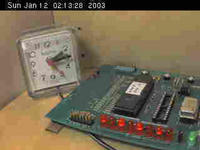| Saturday, January 11, 2003 |
| Free Economy |
 I wrote this little essay some years ago called Free Resources. It pointed out the relatively new phenomenon at the time that it can be quite viable to give things away freely, even for a business. And I also expressed a strategy for gradually making more things free. You know, if I look at the resources available to me, and I identify what I can freely share with others, and I work on increasing the number and variety of resources I can freely share, and others do the same, then we'd gradually be getting somewhere. Somewhere where a lot of what we need is freely and easily available for everybody. I'm not talking about whether I might take time out of my schedule to work hard for some charity once per week. I'm not talking about sacrifice. I'm talking about arranging things so that it is perfectly feasible and comfortable to give something away, without particularly being worse off myself. I wrote this little essay some years ago called Free Resources. It pointed out the relatively new phenomenon at the time that it can be quite viable to give things away freely, even for a business. And I also expressed a strategy for gradually making more things free. You know, if I look at the resources available to me, and I identify what I can freely share with others, and I work on increasing the number and variety of resources I can freely share, and others do the same, then we'd gradually be getting somewhere. Somewhere where a lot of what we need is freely and easily available for everybody. I'm not talking about whether I might take time out of my schedule to work hard for some charity once per week. I'm not talking about sacrifice. I'm talking about arranging things so that it is perfectly feasible and comfortable to give something away, without particularly being worse off myself.
Software remains the best example. Free Open Source software is today the best stuff you can find in a number of categories. The open source model has turned out to be a more reliable and efficient way of producing high quality software and distributing it widely. It costs almost nothing to copy software, and that means in part that smart people can build on lots of other smart people's work, and do something better than they otherwise could. The music market started moving in that direction, of making it easy to share music easily and freely - Napster - but it is a mixed success at this point, as the big central media companies don't understand it, think it is evil, and are spending a lot of resources on making sure their products can't be shared. Lots of free Wi-Fi wireless networks are springing up in many places. Individuals and small companies leave their wireless network open to whoever is in the proximity. They do that either unknowingly, or because they can, and because they think it might useful to somebody. A very small number of ISPs support it. The majority think it is theft and are trying to find ways of making it impossible. There is obvioiusly a clash between different systems and different cultures there. I think it can be a vibrant and viable economic model to work on making more and more things free and easy to distribute widely. And it can very well be very profitable along the way for the originators of technologies and content that supports that. But then there are the big and powerful companies who don't get it, who believe that sharing is theft, and that it couldn't possibly be economically viable for anything to be free. And they're wrong. The most long-term viable production and distribution solution is for it to be free. Sunlight and air is in ample supply, no matter how much you share it and give it away. It brings an interesting secret to light. You know, Monsanto sells suicide seeds to farmers. They work for the crop of one season, but they don't reproduce, so the farmer needs to come back next year and buy new seeds. That's the perfect model for many big corporations, and it is essentially what they're doing. You pay money and buy their product, thinking that it is now yours. And if it really were yours, you could of course do with it what you want, including sharing it with your friends or giving it away to somebody else. But there's a lot of small print, which you usually don't pay attention to. And the legal truth is usually that it isn't yours, even if you paid for it. The solution is obvious if we pay more attention. Focus on alive, fertile, self-reproducing products, that can be modified, expanded, shared, given away, re-combined, re-cycled, re-invented. And start forgetting about suicide products that legally self-destruct in your hands right after you've looked at them, or the moment you consider using them in a new creative or beneficial way. "Out of abundance He took abundance and still abundance remains." -- The Upanishads [ Patterns | 2003-01-11 14:15 | 7 comments | PermaLink ] More > |
| Walking Meditation |
 From Walking Meditation: From Walking Meditation:"This practice is a variation of Vipassana Meditation. [ Inspiration | 2003-01-11 15:31 | 1 comment | PermaLink ] More > |
| Computers and Phones as Remote Control Devices |
 A posting on SmartMobs talks about the possibility of controlling stuff over the net. A posting on SmartMobs talks about the possibility of controlling stuff over the net."We've all heard a lot about Internet Appliances (IA). But how many of you have actually experienced the thrill of commanding an appliance over the internet?And you can do a little actual experiment here. But now, this is one of the things that is puzzling, that this stuff isn't ubiquitous by now. 20-25 years ago when people were soldering together the first micro computers, this was one of the first thoughts. Many computer amateurs were electronic buffs, like myself. Using your new computer to control relays that would turn on the light or draw the curtains according to some clever program - that would be one of the very first cool things you'd want to do. And there were boards and kits available for that, and diagrams in the Ciarcia's Circuit Cellar columns in Byte (a leading computer magazine at the time) on how to do it. But I suppose all the electronics buffs converted to being software people, and they got lost in something else. I for one would enjoy being able to control stuff in my house from my cellphone while I'm traveling. It can be done, with stuff like X10 devices (which I'm not going to link to, because I hate their annoying popup ads), but it is not much easier than 20 years ago. [ Technology | 2003-01-11 18:14 | 2 comments | PermaLink ] More > |